Analysis of a Mental Health Counseling Interview Report, Australia
VerifiedAdded on 2023/01/04
|5
|980
|30
Report
AI Summary
This report provides an analysis of a mental health counseling interview conducted with a 67-year-old Aboriginal male client suffering from psychosocial drug disorder. The report details the client's history of substance abuse and associated health issues, as well as the interview process using semi-structured, open-ended questions. The student reflects on the experience, highlighting the positive aspects of the interview, such as the client's openness, and the challenges, including cultural and language barriers. The report discusses the impact of these barriers on the counseling process, the counselor's self-reflection on techniques used, and proposes strategies for future professional development, such as further education and training in motivational interviewing and culturally competent communication techniques to enhance the effectiveness of psychoactive mental health counseling.
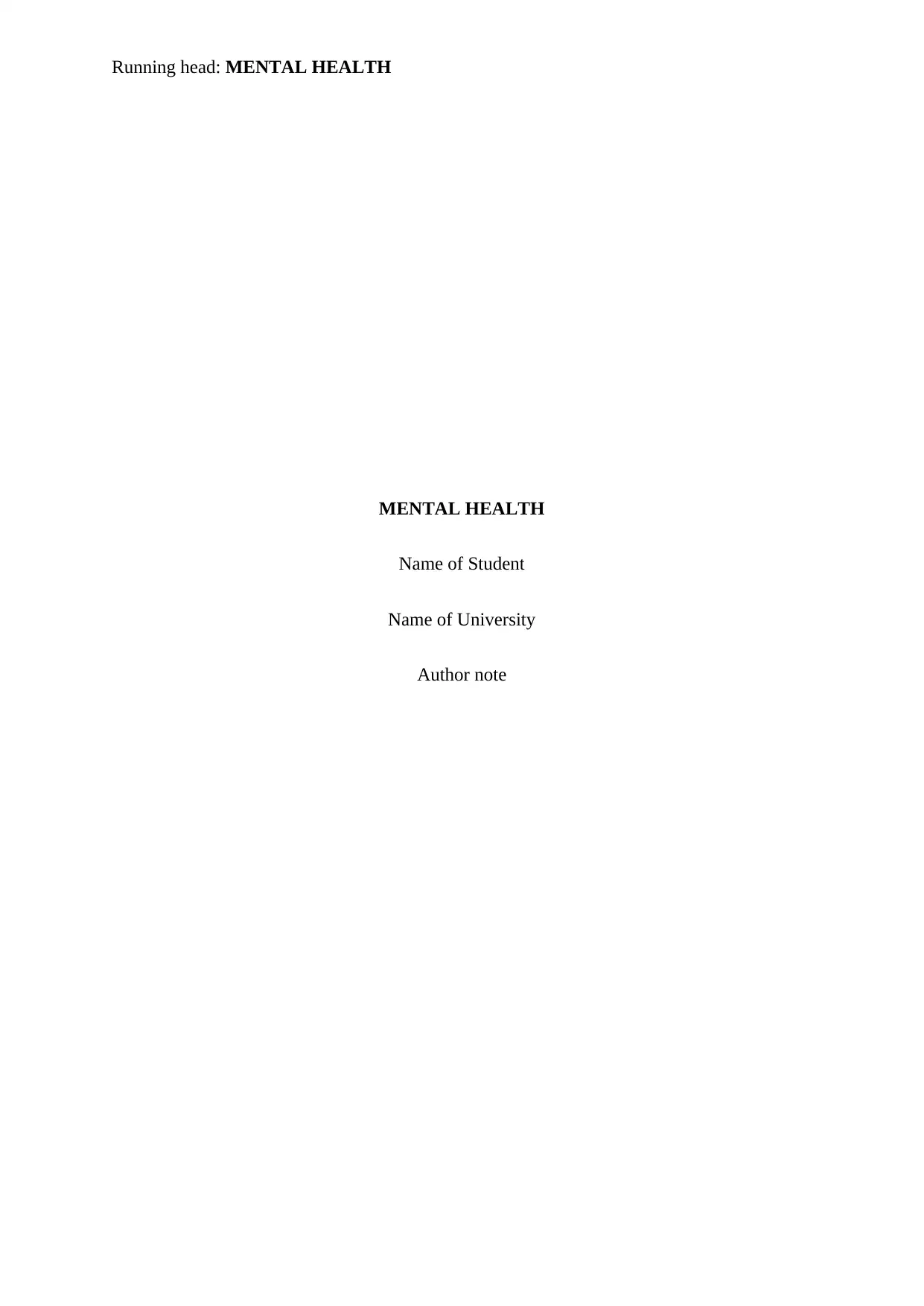
Running head: MENTAL HEALTH
MENTAL HEALTH
Name of Student
Name of University
Author note
MENTAL HEALTH
Name of Student
Name of University
Author note
Paraphrase This Document
Need a fresh take? Get an instant paraphrase of this document with our AI Paraphraser
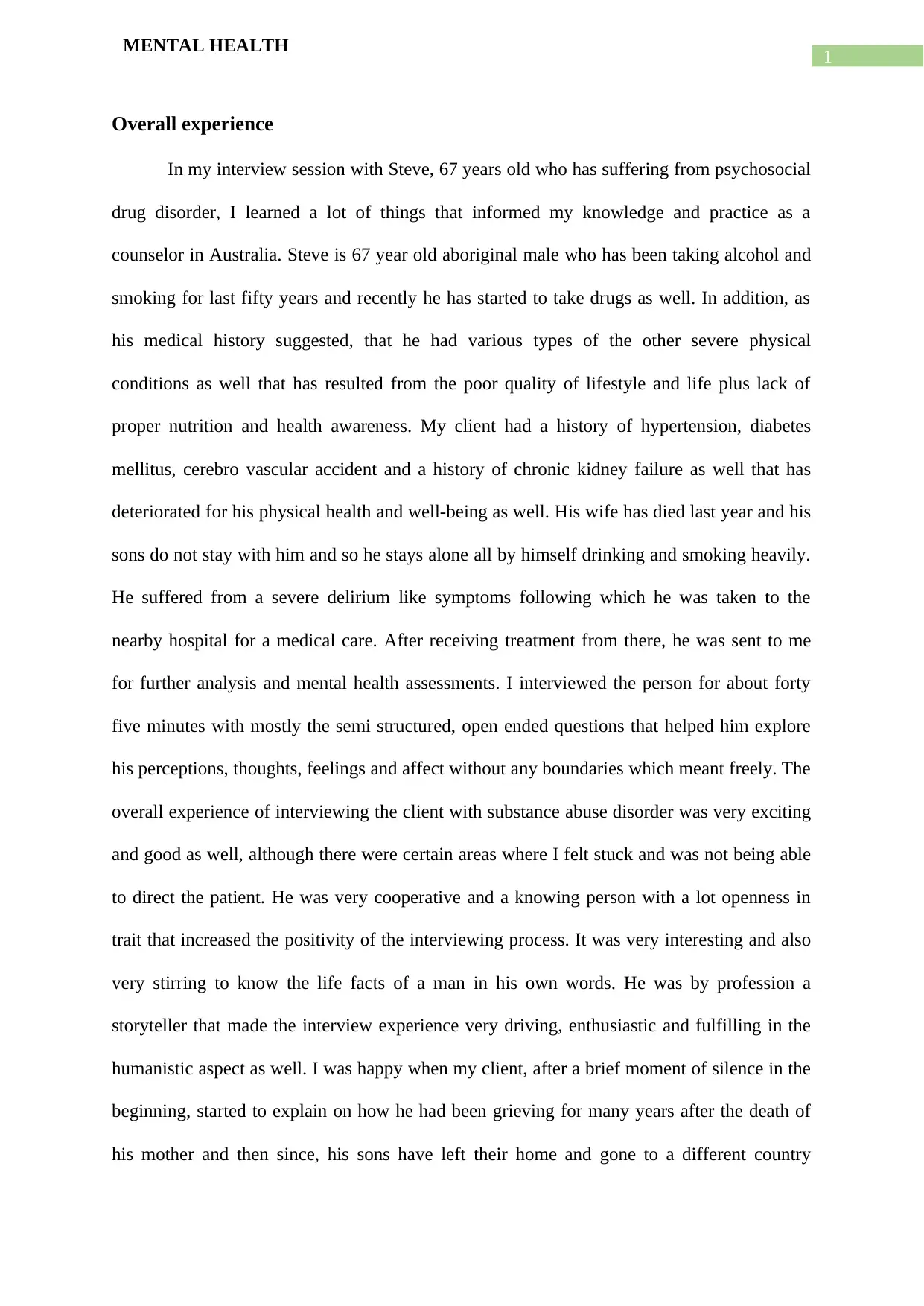
1
MENTAL HEALTH
Overall experience
In my interview session with Steve, 67 years old who has suffering from psychosocial
drug disorder, I learned a lot of things that informed my knowledge and practice as a
counselor in Australia. Steve is 67 year old aboriginal male who has been taking alcohol and
smoking for last fifty years and recently he has started to take drugs as well. In addition, as
his medical history suggested, that he had various types of the other severe physical
conditions as well that has resulted from the poor quality of lifestyle and life plus lack of
proper nutrition and health awareness. My client had a history of hypertension, diabetes
mellitus, cerebro vascular accident and a history of chronic kidney failure as well that has
deteriorated for his physical health and well-being as well. His wife has died last year and his
sons do not stay with him and so he stays alone all by himself drinking and smoking heavily.
He suffered from a severe delirium like symptoms following which he was taken to the
nearby hospital for a medical care. After receiving treatment from there, he was sent to me
for further analysis and mental health assessments. I interviewed the person for about forty
five minutes with mostly the semi structured, open ended questions that helped him explore
his perceptions, thoughts, feelings and affect without any boundaries which meant freely. The
overall experience of interviewing the client with substance abuse disorder was very exciting
and good as well, although there were certain areas where I felt stuck and was not being able
to direct the patient. He was very cooperative and a knowing person with a lot openness in
trait that increased the positivity of the interviewing process. It was very interesting and also
very stirring to know the life facts of a man in his own words. He was by profession a
storyteller that made the interview experience very driving, enthusiastic and fulfilling in the
humanistic aspect as well. I was happy when my client, after a brief moment of silence in the
beginning, started to explain on how he had been grieving for many years after the death of
his mother and then since, his sons have left their home and gone to a different country
MENTAL HEALTH
Overall experience
In my interview session with Steve, 67 years old who has suffering from psychosocial
drug disorder, I learned a lot of things that informed my knowledge and practice as a
counselor in Australia. Steve is 67 year old aboriginal male who has been taking alcohol and
smoking for last fifty years and recently he has started to take drugs as well. In addition, as
his medical history suggested, that he had various types of the other severe physical
conditions as well that has resulted from the poor quality of lifestyle and life plus lack of
proper nutrition and health awareness. My client had a history of hypertension, diabetes
mellitus, cerebro vascular accident and a history of chronic kidney failure as well that has
deteriorated for his physical health and well-being as well. His wife has died last year and his
sons do not stay with him and so he stays alone all by himself drinking and smoking heavily.
He suffered from a severe delirium like symptoms following which he was taken to the
nearby hospital for a medical care. After receiving treatment from there, he was sent to me
for further analysis and mental health assessments. I interviewed the person for about forty
five minutes with mostly the semi structured, open ended questions that helped him explore
his perceptions, thoughts, feelings and affect without any boundaries which meant freely. The
overall experience of interviewing the client with substance abuse disorder was very exciting
and good as well, although there were certain areas where I felt stuck and was not being able
to direct the patient. He was very cooperative and a knowing person with a lot openness in
trait that increased the positivity of the interviewing process. It was very interesting and also
very stirring to know the life facts of a man in his own words. He was by profession a
storyteller that made the interview experience very driving, enthusiastic and fulfilling in the
humanistic aspect as well. I was happy when my client, after a brief moment of silence in the
beginning, started to explain on how he had been grieving for many years after the death of
his mother and then since, his sons have left their home and gone to a different country
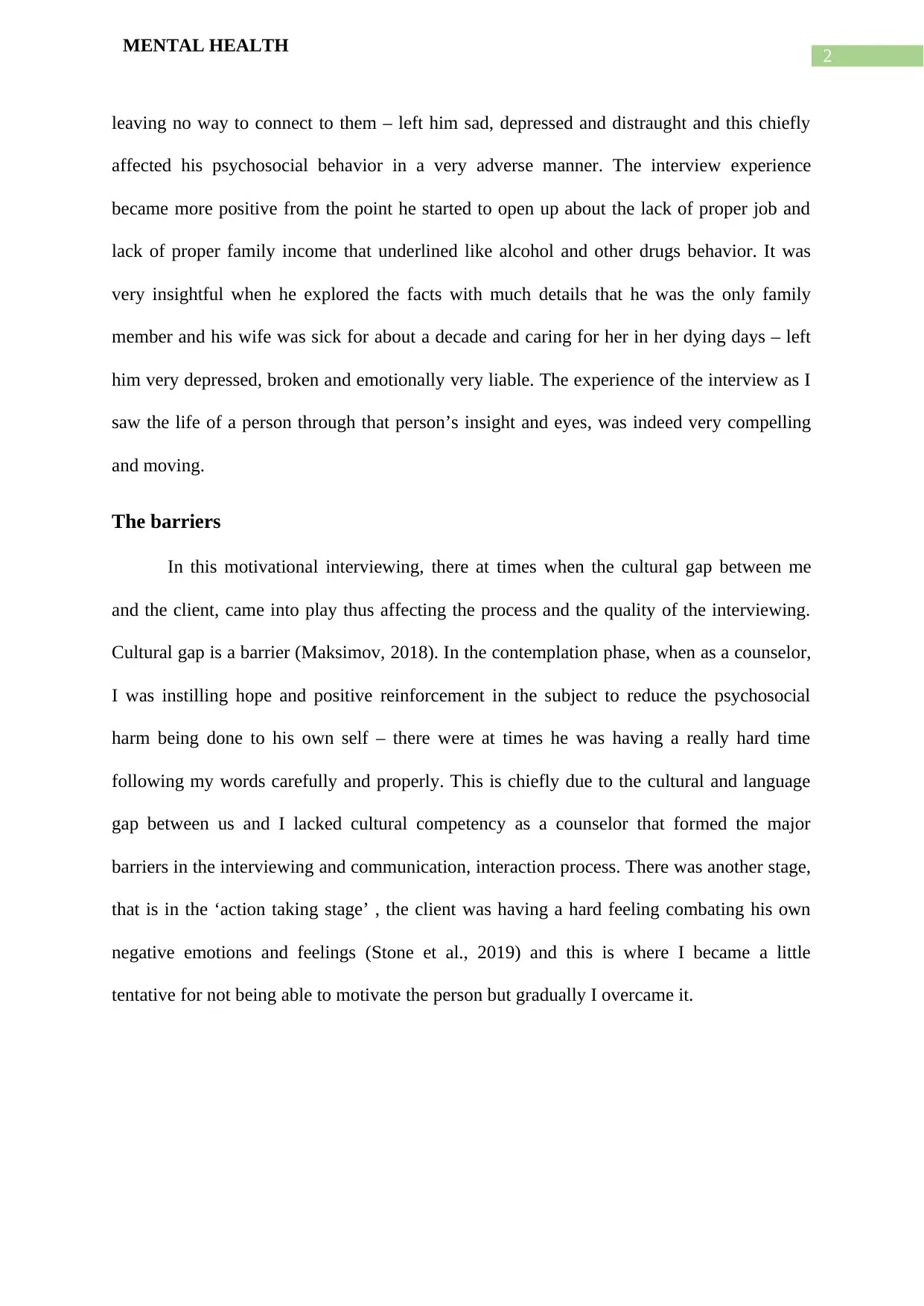
2
MENTAL HEALTH
leaving no way to connect to them – left him sad, depressed and distraught and this chiefly
affected his psychosocial behavior in a very adverse manner. The interview experience
became more positive from the point he started to open up about the lack of proper job and
lack of proper family income that underlined like alcohol and other drugs behavior. It was
very insightful when he explored the facts with much details that he was the only family
member and his wife was sick for about a decade and caring for her in her dying days – left
him very depressed, broken and emotionally very liable. The experience of the interview as I
saw the life of a person through that person’s insight and eyes, was indeed very compelling
and moving.
The barriers
In this motivational interviewing, there at times when the cultural gap between me
and the client, came into play thus affecting the process and the quality of the interviewing.
Cultural gap is a barrier (Maksimov, 2018). In the contemplation phase, when as a counselor,
I was instilling hope and positive reinforcement in the subject to reduce the psychosocial
harm being done to his own self – there were at times he was having a really hard time
following my words carefully and properly. This is chiefly due to the cultural and language
gap between us and I lacked cultural competency as a counselor that formed the major
barriers in the interviewing and communication, interaction process. There was another stage,
that is in the ‘action taking stage’ , the client was having a hard feeling combating his own
negative emotions and feelings (Stone et al., 2019) and this is where I became a little
tentative for not being able to motivate the person but gradually I overcame it.
MENTAL HEALTH
leaving no way to connect to them – left him sad, depressed and distraught and this chiefly
affected his psychosocial behavior in a very adverse manner. The interview experience
became more positive from the point he started to open up about the lack of proper job and
lack of proper family income that underlined like alcohol and other drugs behavior. It was
very insightful when he explored the facts with much details that he was the only family
member and his wife was sick for about a decade and caring for her in her dying days – left
him very depressed, broken and emotionally very liable. The experience of the interview as I
saw the life of a person through that person’s insight and eyes, was indeed very compelling
and moving.
The barriers
In this motivational interviewing, there at times when the cultural gap between me
and the client, came into play thus affecting the process and the quality of the interviewing.
Cultural gap is a barrier (Maksimov, 2018). In the contemplation phase, when as a counselor,
I was instilling hope and positive reinforcement in the subject to reduce the psychosocial
harm being done to his own self – there were at times he was having a really hard time
following my words carefully and properly. This is chiefly due to the cultural and language
gap between us and I lacked cultural competency as a counselor that formed the major
barriers in the interviewing and communication, interaction process. There was another stage,
that is in the ‘action taking stage’ , the client was having a hard feeling combating his own
negative emotions and feelings (Stone et al., 2019) and this is where I became a little
tentative for not being able to motivate the person but gradually I overcame it.
⊘ This is a preview!⊘
Do you want full access?
Subscribe today to unlock all pages.

Trusted by 1+ million students worldwide
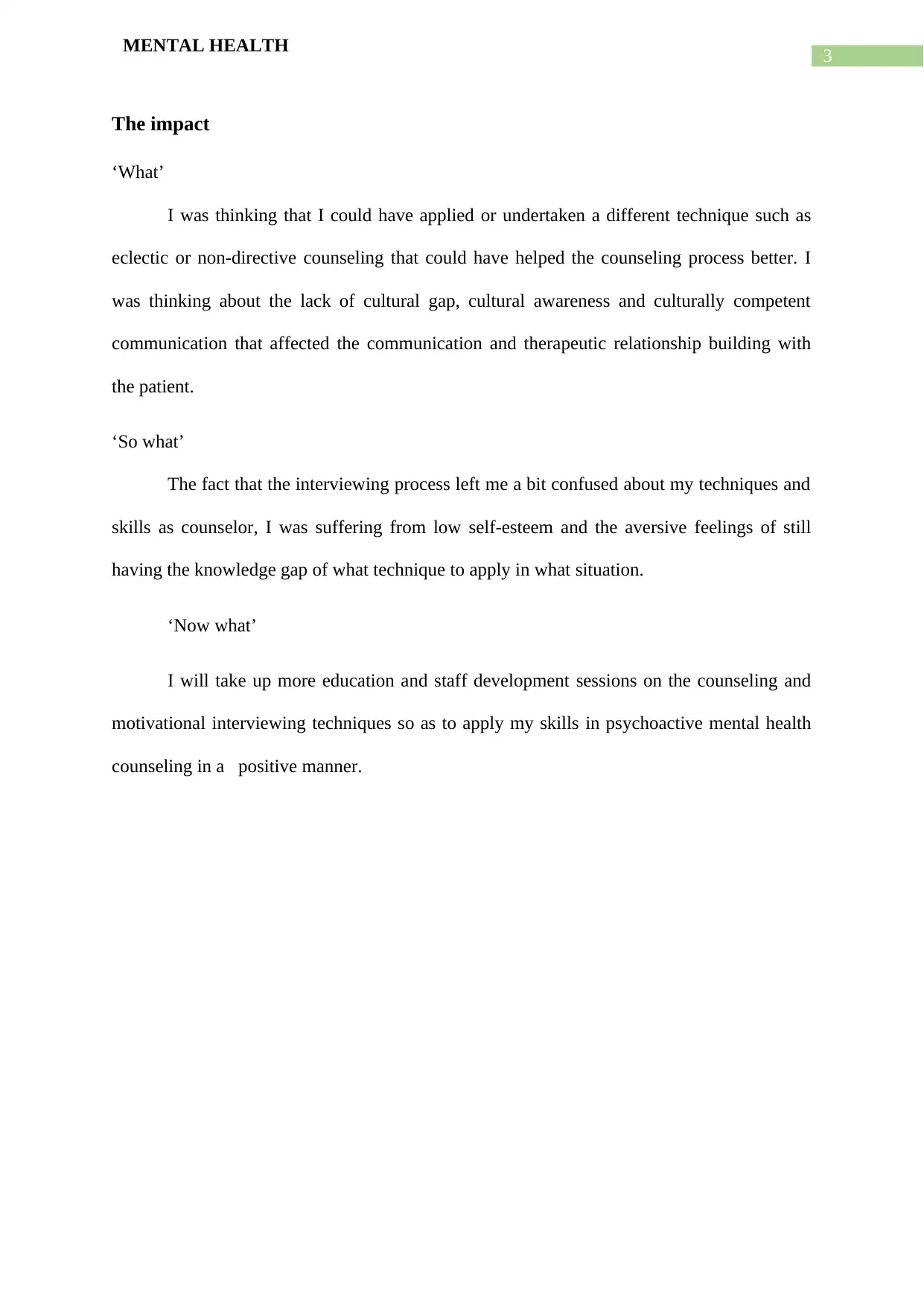
3
MENTAL HEALTH
The impact
‘What’
I was thinking that I could have applied or undertaken a different technique such as
eclectic or non-directive counseling that could have helped the counseling process better. I
was thinking about the lack of cultural gap, cultural awareness and culturally competent
communication that affected the communication and therapeutic relationship building with
the patient.
‘So what’
The fact that the interviewing process left me a bit confused about my techniques and
skills as counselor, I was suffering from low self-esteem and the aversive feelings of still
having the knowledge gap of what technique to apply in what situation.
‘Now what’
I will take up more education and staff development sessions on the counseling and
motivational interviewing techniques so as to apply my skills in psychoactive mental health
counseling in a positive manner.
MENTAL HEALTH
The impact
‘What’
I was thinking that I could have applied or undertaken a different technique such as
eclectic or non-directive counseling that could have helped the counseling process better. I
was thinking about the lack of cultural gap, cultural awareness and culturally competent
communication that affected the communication and therapeutic relationship building with
the patient.
‘So what’
The fact that the interviewing process left me a bit confused about my techniques and
skills as counselor, I was suffering from low self-esteem and the aversive feelings of still
having the knowledge gap of what technique to apply in what situation.
‘Now what’
I will take up more education and staff development sessions on the counseling and
motivational interviewing techniques so as to apply my skills in psychoactive mental health
counseling in a positive manner.
Paraphrase This Document
Need a fresh take? Get an instant paraphrase of this document with our AI Paraphraser
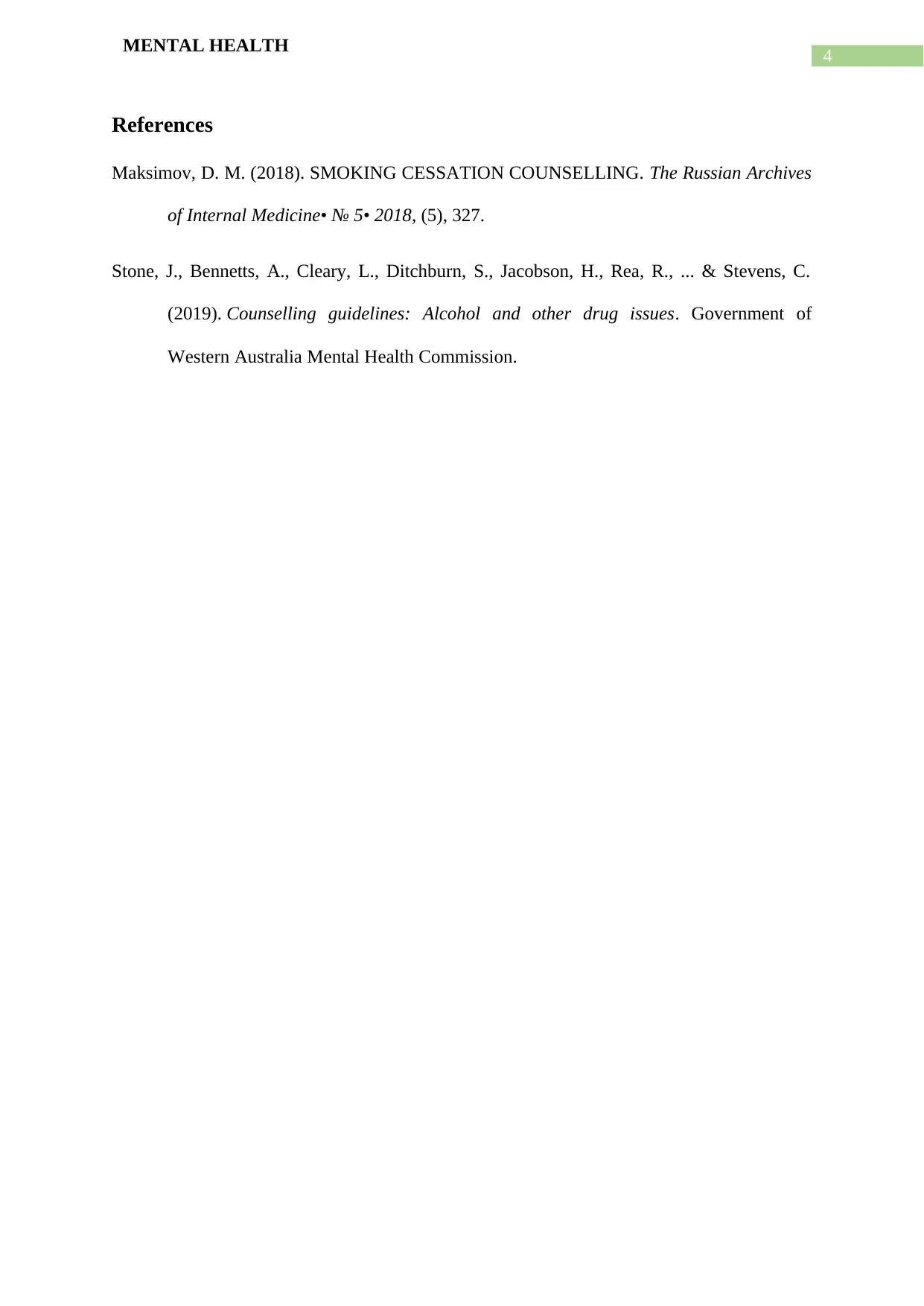
4
MENTAL HEALTH
References
Maksimov, D. M. (2018). SMOKING CESSATION COUNSELLING. The Russian Archives
of Internal Medicine• № 5• 2018, (5), 327.
Stone, J., Bennetts, A., Cleary, L., Ditchburn, S., Jacobson, H., Rea, R., ... & Stevens, C.
(2019). Counselling guidelines: Alcohol and other drug issues. Government of
Western Australia Mental Health Commission.
MENTAL HEALTH
References
Maksimov, D. M. (2018). SMOKING CESSATION COUNSELLING. The Russian Archives
of Internal Medicine• № 5• 2018, (5), 327.
Stone, J., Bennetts, A., Cleary, L., Ditchburn, S., Jacobson, H., Rea, R., ... & Stevens, C.
(2019). Counselling guidelines: Alcohol and other drug issues. Government of
Western Australia Mental Health Commission.
1 out of 5
Related Documents
Your All-in-One AI-Powered Toolkit for Academic Success.
+13062052269
info@desklib.com
Available 24*7 on WhatsApp / Email
![[object Object]](/_next/static/media/star-bottom.7253800d.svg)
Unlock your academic potential
Copyright © 2020–2026 A2Z Services. All Rights Reserved. Developed and managed by ZUCOL.





